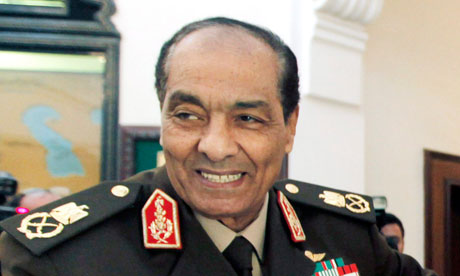|
Latest WikiLeaks cables reveal Israel's fears and alliances
David Leigh and James Ball
guardian.co.uk, Thursday 7 April 2011

Mohammed Tantawi, who heads Egypt's ruling military council, is named in WikiLeaks cables about Israel as an 'obstacle' in efforts to stop weapons smuggling into Gaza. Photograph: Nasser Nasser/EPA
Mohammed Tantawi, the head of Egypt's ruling generals, was an obstacle to Israeli efforts to stop arms smuggling within the Gaza strip, according to Israeli security forces. The assessment was privately delivered to US diplomats, alongside praise for former intelligence chief Omar Suleiman's efforts to stop weapons trafficking, according to theWikiLeaks embassy cables.
The revelations come in a tranche of the most militarily sensitive cables from the US embassy in Tel Aviv. They have been handed over to Israeli newspapers by WikiLeaks founder Julian Assange.
The Hebrew-language paper Yediot this week announced a deal under which it will print an interview with Assange, who has recently had to defend WikiLeaks from accusations of antisemitism.
The cables show intimate co-operation between US and Israeli intelligence organisations. Israel's preoccupation with Iranian nuclear ambitions is well known and the US cables detail the battering on the subject that diplomats repeatedly receive from Tel Aviv.
They also shed detailed and sometimes unexpected light on Israel's military analyses of its other enemies and friends in the region.
Egypt is the primary route for weapons and munitions into the Gaza strip, and the US has been facilitating co-operation between Israel and Egypt to tackle this for several years.
On arms smuggling across the Egyptian border to Hamas in Gaza, Israeli intelligence chiefs described as "supportive" Omar Suleiman, who was Egypt's intelligence minister, but said defence minister Mohammed Hussein Tantawi was "an obstacle" in a November 2009 cable.
Another cable seen by the Guardian reveals that the King of Bahrain, whose Arab state has recently been shaken by protests, has had friendly links with the Mossad, the Israeli intelligence agency.
The cables report a private talk between the then US ambassador, William Monroe, and King Hamad of Bahrain in the king's palace on 15 February 2005. Monroe reported back to Washington: "He [the king] revealed that Bahrain already has contacts with Israel at the intelligence/security level (ie with Mossad) and indicated that Bahrain will be willing to move forward in other areas."
The cables also shed light on Israel's assessment of Hezbollah's mounting capability to strike directly at Tel Aviv with an arsenal of more than 20,000 missiles.
Israeli intelligence chiefs briefed their US counterparts during a regular Joint Political Military Group (JPMG) session on 18 November 2009 aboutthe scale of potential Hezbollah attacks from Lebanon.
Washington was told: "Hezbollah possesses over 20,000 rockets ... Hezbollah was preparing for a long conflict with Israel in which it hopes to launch a massive number of rockets at Israel per day. A Mossad official estimated that Hezbollah will try to launch 400-600 rockets and missiles at Israel per day – 100 of which will be aimed at Tel Aviv. He noted that Hezbollah is looking to sustain such launches for at least two months."
Other cables detail regular secret talks between the US and Yuval Diskin, head of Israel's internal security agency, Shin Beth, over the role of Hamas in Gaza. On 12 November 2009 the embassy reported the views of the general responsible for Gaza and southern Israel, Major General Yoav Galant, that Hamas needed to be "strong enough to enforce a ceasefire".
He told the Americans: "Israel's political leadership has not yet made the necessary policy choices among competing priorities: a short-term priority of wanting Hamas to be strong enough to enforce the de facto ceasefire and prevent the firing of rockets and mortars into Israel; a medium priority of preventing Hamas from consolidating its hold on Gaza; and a longer-term priority of avoiding a return of Israeli control of Gaza and full responsibility for the wellbeing of Gaza's civilian population."
Galant was to be made Israel's chief of defence staff earlier this year but the appointment was cancelled due to scandal. |